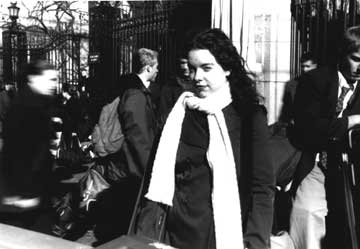
|
|
Kate Cortesi
|
Kate Cortesi, CC'01, hurries down the sidewalk, up a set of stone steps and into the Broadway Presbyterian Church where on this and every other Sunday she performs for the congregation on her violin.
But she would tell you "I'm not a violinist."
This same young woman, for several weeks last June, slept in a hut in a remote coffee farming cooperative in Chiapas, Mexico, as part of an international peace-keeping effort for which she served, essentially, as a human shield.
Yet, she would say, "I'm no activist."
In January she was stationed in Manchester, N.H., helping Village Voice columnist Jim Ridgeway to gather news on the first presidential primaries.
So, is she a journalist? Not according to her.
"At the end of the day," she says, "I'm just an intellectual."
Activity, then, if not activism or journalism or music, is Cortesi's governing principle at Columbia. This double major in history and visual arts also paints, wrote a one-act play for seven characters entitled Telephone that was staged in Lerner Hall last December (and already has another play in the pipeline), interns at the Voice, is learning the arts of printmaking and glassblowing, taps out a column for the Columbia Daily Spectator, shakes (or stirs, if preferred) martinis for the Columbia Bartending/Mixology Agency and, of course, shoulders a full load of classes.
Her time is so oversubscribed it's days before she can find a free moment even to return a phone call. Easing up, however, is out of the question. Rather, Cortesi is avid for more, ready to dive into any new endeavor, project or cause that sparks an interest in her.
Exhausting as it is, this kind of full-throttle life is just what she came to Columbia to find. When it was time in high school to shop for a college, the Washington, D.C., native immediately narrowed her list to ones with urban addresses. Cortesi was after opportunities--as many as possible for pursuing her interests and for discovering new ones. "To get what I was looking for, I had to go to a city school--a big-city school," she says, "so naturally I had to start here."
She did, and stopped looking. Columbia and New York met Cortesi's requisites so completely that her parents, both Harvard graduates, couldn't persuade her to apply to their alma mater. She applied for early decision to Columbia instead and was accepted.
Cortesi saw at Columbia that if the school could not provide a certain opportunity then New York City would, and vice versa. After deciding to give journalism a try, for instance, she applied in the fall of her sophomore year for an internship at papers around the city. But without having written even one story for so much as a high school weekly, her applications were rejected.
So she turned to the Spectator where she wrote a column, "Hard to Swallow," covering topics from the insurgency in Chiapas and the independence movement of East Timor to Thanksgiving's dispossessed and the rumors surrounding the latest date-rape drug.
"I was motivated to start [writing journalism] as much from a feeling of having been a little bit lied to as from a desire to be a journalist," Cortesi says. "Before coming here I wasn't taught to think critically."
She found that critical thinking is an ambient course at Columbia, lessons in which come at any time and from any quarter: in late-night debates with friends on her floor in East Campus as well as in Eric Foner's American history class. "At this place I'm getting my hands on more and more information by being around people who are better critical thinkers [than I am], and that excites me to have a perspective--one that gets me thinking."
In the summer, with a sheaf of clips bearing her name, Cortesi reapplied for an internship. This time she was snapped up by the Village Voice. She now spends about 20 hours each week assisting Ridgeway with his "Inside Washington" column.
But it was to the city that she turned when her "need for an audience" was stymied on campus. A member of the string sections in two Washington orchestras while in high school, Cortesi was accustomed to playing one or two concerts a week. Yet after finding that the Columbia orchestra plays but one or two concerts a semester, Cortesi crossed to the far side of the boulevard and went into Broadway Presbyterian on the corner of 114th Street. The organist, Jeremy Clayre, accepted her proposal to accompany him on her violin during Sunday services. With that she had her audience--although one unlike any she had ever performed for.
"One Sunday I played a Dvorák sonatina, and after the service a frail, wrinkly, tiny old woman came up to me with tears in her eyes. She told me her husband of something like 50 years had died a couple of weeks before and she'd heard his voice through my violin as I played the sonatina--that brought me to tears."
Of her Sundays at the church, Cortesi says they taught her she "doesn't have to be a violinist to be a violinist." That is a formula she might also have derived from any one of her activities at Columbia: she doesn't have to be a journalist to be a journalist nor an activist to be an activist . . . nor, as she recently learned, a student to be a student.
It was while out of school on winter break that Cortesi spent time in New Hampshire helping Ridgeway both to cover the primaries for the Voice and to shoot a film of them for the Learning Channel. The education in American politics and the electoral process she received there was an "opportunity of a lifetime--one [she] wouldn't have missed for anything in the world," she says. The sort of opportunity Cortesi has come to expect from her world at Columbia.
|
